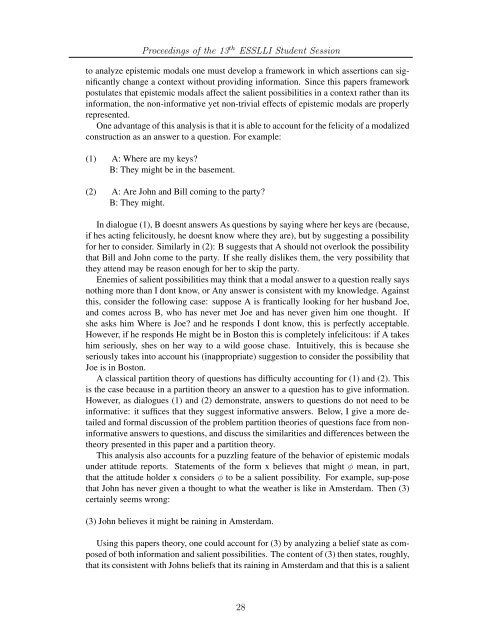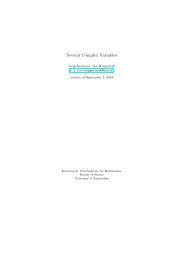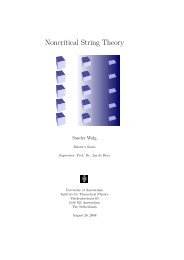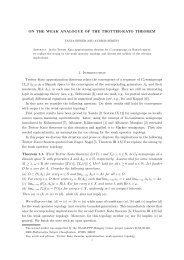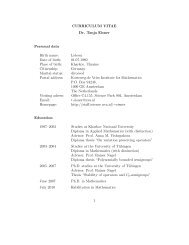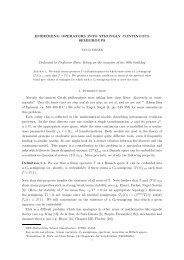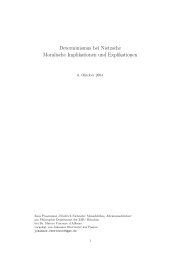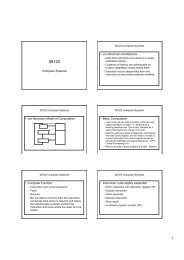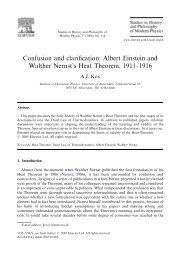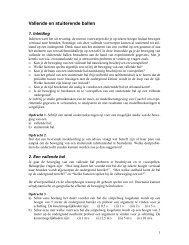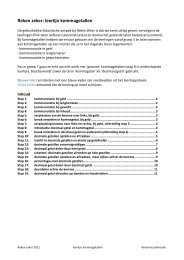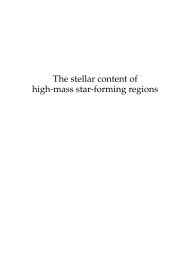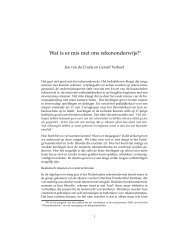Proceedings of the 13 ESSLLI Student Session - Multiple Choices ...
Proceedings of the 13 ESSLLI Student Session - Multiple Choices ...
Proceedings of the 13 ESSLLI Student Session - Multiple Choices ...
You also want an ePaper? Increase the reach of your titles
YUMPU automatically turns print PDFs into web optimized ePapers that Google loves.
<strong>Proceedings</strong> <strong>of</strong> <strong>the</strong> <strong>13</strong> th <strong>ESSLLI</strong> <strong>Student</strong> <strong>Session</strong><br />
to analyze epistemic modals one must develop a framework in which assertions can significantly<br />
change a context without providing information. Since this papers framework<br />
postulates that epistemic modals affect <strong>the</strong> salient possibilities in a context ra<strong>the</strong>r than its<br />
information, <strong>the</strong> non-informative yet non-trivial effects <strong>of</strong> epistemic modals are properly<br />
represented.<br />
One advantage <strong>of</strong> this analysis is that it is able to account for <strong>the</strong> felicity <strong>of</strong> a modalized<br />
construction as an answer to a question. For example:<br />
(1) A: Where are my keys?<br />
B: They might be in <strong>the</strong> basement.<br />
(2) A: Are John and Bill coming to <strong>the</strong> party?<br />
B: They might.<br />
In dialogue (1), B doesnt answers As questions by saying where her keys are (because,<br />
if hes acting felicitously, he doesnt know where <strong>the</strong>y are), but by suggesting a possibility<br />
for her to consider. Similarly in (2): B suggests that A should not overlook <strong>the</strong> possibility<br />
that Bill and John come to <strong>the</strong> party. If she really dislikes <strong>the</strong>m, <strong>the</strong> very possibility that<br />
<strong>the</strong>y attend may be reason enough for her to skip <strong>the</strong> party.<br />
Enemies <strong>of</strong> salient possibilities may think that a modal answer to a question really says<br />
nothing more than I dont know, or Any answer is consistent with my knowledge. Against<br />
this, consider <strong>the</strong> following case: suppose A is frantically looking for her husband Joe,<br />
and comes across B, who has never met Joe and has never given him one thought. If<br />
she asks him Where is Joe? and he responds I dont know, this is perfectly acceptable.<br />
However, if he responds He might be in Boston this is completely infelicitous: if A takes<br />
him seriously, shes on her way to a wild goose chase. Intuitively, this is because she<br />
seriously takes into account his (inappropriate) suggestion to consider <strong>the</strong> possibility that<br />
Joe is in Boston.<br />
A classical partition <strong>the</strong>ory <strong>of</strong> questions has difficulty accounting for (1) and (2). This<br />
is <strong>the</strong> case because in a partition <strong>the</strong>ory an answer to a question has to give information.<br />
However, as dialogues (1) and (2) demonstrate, answers to questions do not need to be<br />
informative: it suffices that <strong>the</strong>y suggest informative answers. Below, I give a more detailed<br />
and formal discussion <strong>of</strong> <strong>the</strong> problem partition <strong>the</strong>ories <strong>of</strong> questions face from noninformative<br />
answers to questions, and discuss <strong>the</strong> similarities and differences between <strong>the</strong><br />
<strong>the</strong>ory presented in this paper and a partition <strong>the</strong>ory.<br />
This analysis also accounts for a puzzling feature <strong>of</strong> <strong>the</strong> behavior <strong>of</strong> epistemic modals<br />
under attitude reports. Statements <strong>of</strong> <strong>the</strong> form x believes that might φ mean, in part,<br />
that <strong>the</strong> attitude holder x considers φ to be a salient possibility. For example, sup-pose<br />
that John has never given a thought to what <strong>the</strong> wea<strong>the</strong>r is like in Amsterdam. Then (3)<br />
certainly seems wrong:<br />
(3) John believes it might be raining in Amsterdam.<br />
Using this papers <strong>the</strong>ory, one could account for (3) by analyzing a belief state as composed<br />
<strong>of</strong> both information and salient possibilities. The content <strong>of</strong> (3) <strong>the</strong>n states, roughly,<br />
that its consistent with Johns beliefs that its raining in Amsterdam and that this is a salient<br />
28


